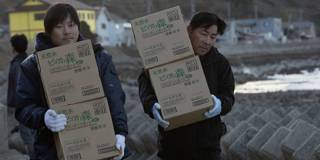While no economy can be expected to achieve a truly fair distribution of income, government-led redistribution can help. So should philanthropy, both across and within communities – an area where Japan falls short.
TOKYO – On January 1, as Japan celebrated the new year, a 7.5-magnitude earthquake struck the Noto peninsula, causing buildings to crumble, forcing mass evacuations, and leading to more than 200 deaths. But in the wake of the tragedy, something beautiful happened: an outpouring of support by philanthropic organizations and individuals, including support from beyond Japan’s borders. More than 140,000 people donated $5 million through the Nippon Foundation alone.

TOKYO – On January 1, as Japan celebrated the new year, a 7.5-magnitude earthquake struck the Noto peninsula, causing buildings to crumble, forcing mass evacuations, and leading to more than 200 deaths. But in the wake of the tragedy, something beautiful happened: an outpouring of support by philanthropic organizations and individuals, including support from beyond Japan’s borders. More than 140,000 people donated $5 million through the Nippon Foundation alone.